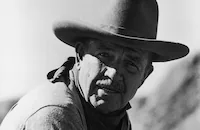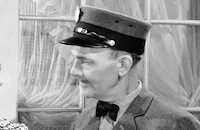Sorrowful Jones

Brief Synopsis
Cast & Crew
Sidney Lanfield
Bob Hope
Lucille Ball
William Demarest
Bruce Cabot
Thomas Gomez
Film Details
Technical Specs

Synopsis
New York bookie Sorrowful Jones runs his "horse room" from behind a false wall in a Broadway barber shop. When gangster Big Steve Holloway's horse Dreamy Joe makes a surprise win, Sorrowful reluctantly pays his customers, all of whom had bet on the horse. That night, Sorrowful arrives at Big Steve's nightclub for a meeting and is surprised to find all the local bookies gathered together. Big Steve reveals to them that he fixed the race by giving Dreamy Joe a "speedball," and now demands a $1,000 payment from each bookie in exchange for notifying them in advance when Dreamy Joe will lose or win. Before the next race, Sorrowful accepts bets on Dreamy Joe, although he knows the horse will lose. Against his own rules, he even accepts a marker from Orville Smith, who leaves his four-year-old daughter Martha Jane as collateral. Orville is killed by Big Steve and his henchman, Once Over Sam, after intercepting a phone call in his office and learning about Big Steve's subterfuge. When Orville does not return for Martha Jane, Sorrowful's partner, Regret, insists that Sorrowful take Martha Jane home for the night. The next day, Sorrowful's former girl friend, burlesque performer Gladys O'Neill, comes by to help take care of the girl. Big Steve also visits and reveals that the racing commission is investigating him. In order to make a final win with Dreamy Joe, Big Steve transfers ownership of the horse to Martha Jane, and plans to drug the horse at the next race, which will kill it. Later, Orville's body is found floating in the East River, and Sorrowful learns that the little girl's mother is also dead. Unaware of Big Steve's set-up, Gladys insists that Sorrowful give Martha Jane all of Dreamy Joe's winnings if he should win the next race, or else she will turn him in to the police. Big Steve soon discovers that Martha Jane is Orville's daughter and seeks to get rid of her, but Sorrowful hides her on a fire escape and refuses to allow Big Steve or Sam to take her. Martha Jane falls from the fire escape and is hospitalized, and while she is in a coma, she calls out for Dreamy Joe. Desperate to save the little girl, Sorrowful and Regret steal Dreamy Joe from the racetrack and bring the horse into Martha Jane's hospital room. The horse's whinny awakens Martha Jane out of her coma just as police detective Reardon arrests Big Steve and Sam for Orville's murder. When Reardon suggests that Martha Jane will be placed in an orphanage, Sorrowful proposes to Gladys, and they marry, and spend their honeymoon taking their newly adopted daughter Martha Jane to an arcade.

Director
Sidney Lanfield
Cast

Bob Hope

Lucille Ball

William Demarest

Bruce Cabot

Thomas Gomez
Tom Pedi
Paul Lees
Houseley Stevenson
Ben Weldon

Emmett Vogan
Mary Jane Saunders
Walter Winchell
John Shay
John "skins" Miller
Allen Ray
Sam Finn
Bob Kortman
James Davies
John Mallon
Frank Mills
Tony Cirillo
Jack Roberts
James Cornell
Douglas Carter
Dario Piazza
Helen Chapman
Josephine Allen
Sid Tomack
Patsy O'byrne
Ralph Peters
Ed Dearing
Arthur Space
William J. Cartledge
Speer Martin
Mickey Martin
Pat Lane
Billy Snyder
Kid Chissell
Eddie Rio
Marc Krah

John Butler
Charley Cooley
Jerry Hunter
William Yip
George Chan
Erville Alderson
Harry Tyler
Ethel Bryant
Betty Corner
Louise Lorimer
Sally Rawlinson
Eric Alden
Lyle Moraine
Clara Carleton
Charles Hamilton
Len Hendry
Delmar Thomas
Henry Hope
Crew
Haskell Boggs
Effie I. Canning
Sam Comer
John Cope
Earl Crowell
Mary Kay Dodson
Robert Emmett Dolan
Hans Dreier
Farciot Edouart
Ray Evans
Daniel L. Fapp
Bertram Granger
Lupe Hall
Edmund Hartmann
Gordon Jennings
Harold Lewis
Jay Livingston
Nellie Manley
Curtis Mick
Irving Newmeyer
Albert Nozaki
G. E. Richardson
Jack Rose
Oscar Rudolph
Arthur Schmidt
Melville Shavelson
Robert L. Welch
Wally Westmore

Film Details
Technical Specs

Articles
Sorrowful Jones
Directed by Sidney Lanfield, Sorrowful Jones began its life as an adaptation by Gladys Lehman, Sam Hellman and William R. Lipman, which Melville Shavelson, Edmund L. Hartmann and Jack Rose used to create the screenplay. Production took place on the Paramount lot in Hollywood on a relatively short schedule from April 7th to early June of 1948. Bob Hope would later remember the film in his memoir as being "memorable for two reasons: it was my first time out in a semi-serious role; and it was my first movie with Lucille Ball. The story was from Damon Runyon, and I had a great fondness for him." Ball nearly missed out on her chance to appear in Sorrowful Jones; she learned that Paramount had not chosen an actress to play opposite Hope only days before production was scheduled to begin, but once she found out, she campaigned hard with the front office for the role. The studio was reluctant to cast her until Hope told them that "[s]he'd be tops. I want her to get it." Columnist and broadcaster Walter Winchell did the opening narration for the film, but rather than accept a salary for his work, he chose instead to donate it to the Damon Runyon Cancer Fund (now The Damon Runyon Cancer Research Foundation), which Winchell had founded in his friend's memory just after Runyon's death on December 10, 1946.
When Sorrowful Jones premiered in New York on June 5, 1949, it was met with grudging approval by Bosley Crowther, the irascible New York Times film critic who wrote, "a serious student of the late Damon Runyon's works, in which the story of Little Miss Marker is somewhere near the top, might even find it difficult to recognize a Runyon character in this film. Certainly the Sorrowful of the story is not apparent in the shape of Mr. Hope. But once this distinction is realized and the customer is prepared to forget that Little Miss Marker --and Mr. Runyon--had a strict brand of sentiment, then Mr. Hope's own personal Sorrowful--and this film--should be hugely enjoyed. [...] Three energetic gag-writers have provided him with a script that is loaded with farce situations and explosively funny gag lines. And Sidney Lanfield, the director, has kept the camera virtually handcuffed to him." Life magazine agreed, saying that Hope showed "unexpected talents."
Hope and Ball would repeat their Sorrowful Jones roles later in the year when they appeared in the Lux Radio Theater adaptation in November 1949. Shortly after completion of Sorrowful Jones, Lucille Ball would begin a new radio program, My Favorite Husband, which would be the inspiration for I Love Lucy.
By Lorraine LoBianco

Sorrowful Jones
Quotes
He makes a monkey out of me? Well I'll make an omelet outta him!- Once Over Sam
Trivia
Notes
The film's title card reads: "Damon Runyon's Sorrowful Jones." The film opens with a foreword narrated by newsman Walter Winchell, who was a good friend of Runyon's. According to a Paramount News item, Winchell donated his salary to the Damon Runyon Cancer Fund, which Winchell had established in the writer's name. Although Maurice Cass is listed in the CBCS as "Psychiatrist," Emmett Vogan plays that role, and Cass does not appear in the film. This film marked Mary Jane Saunders' feature film debut. Also included in the film are excerpts from a number of popular songs, such as "Yankee Doodle Dandy" and "Sweet Adeline." The 1934 Paramount film on which Sorrowful Jones was partially based was titled Little Miss Marker, and was directed by Alexander Hall, and starred Adolphe Menjou and Shirley Temple (see AFI Catalog of Feature Films, 1931-40; F3.2523). Also based on Runyon's story were Universal's 1962 film Forty Pounds of Trouble, directed by Norman Jewison and starring Tony Curtis, Suzanne Pleshette and Claire Wilcox; and Universal's 1980 film Little Miss Marker, directed by Walter Bernstein and starring Walter Matthau, Julie Andrews and Tony Curtis. Bob Hope and Lucille Ball reprised their roles in a Lux Radio Theatre broadcast on November 21, 1949.

Miscellaneous Notes
Released in United States on Video April 7, 1988
Released in United States Summer July 4, 1949
Re-released in United States on Video May 19, 1993
Released in United States on Video April 7, 1988
Re-released in United States on Video May 19, 1993
Released in United States Summer July 4, 1949













